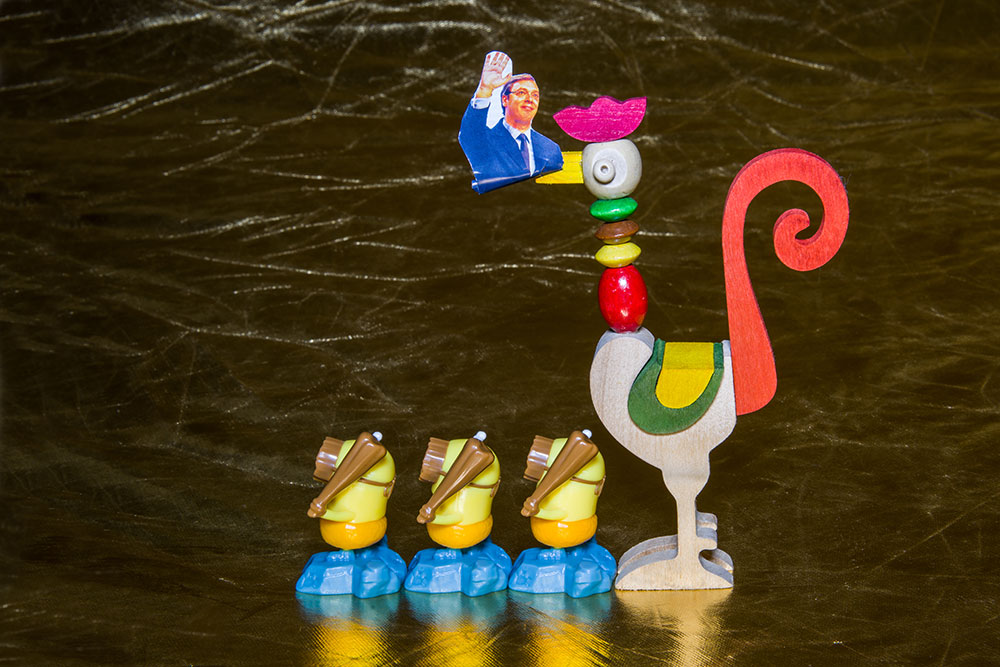
Almost every year, when the time comes, A. Vučić goes to Davos. This is where Thomas Mann’s The Magic Mountain was written, where Hans Castorp and other moribunds were treated for fever with strong food and fresh, cold air in the Berghof Hotel. We have no indication that our ruler has read any book by Mann, not even Confessions of Felix Krull, Confidence Man. If he had, he would have already bragged about it.
I wonder what he was even doing there and what was supposed to be the benefit of this winter holiday. It seems there is none, if the experience of his past excursions has taught us anything.
A. Vučić arrived at the World Economic Forum in Davos as a branded autocrat, the leader of a band of thugs and ne’er-do-wells, the one who stole the election and extinguished the fundamental democratic rights of the citizens of a European country. With such a reputation, he was left on the very margin and in the corners, a spot reserved for those not suitable for company. He felt this, but did not understand it and tried to present it as if he was in the very center of things.
Some media reported on who he met with there, and how they discussed important issues for the future of Serbia, and other such phrases covering up the absence of any meaningful content. Somehow he managed to meet with the U.S. Assistant Secretary of State for European and Eurasian Affairs, James O’Brien, and talk to him about the future, relations with Priština and improving relations with the USA. In that order, A. Vučić explained his part of the mission on Instagram. We don’t know which words were said, let alone what the future of Serbia is and why he was the one dealing with it in the first place.
The conversation took place during a nighttime winter walk, in the idyllic setting of the magic mountain, where the Serbian absolutist tried to explain the relationship between power for local use and the lack of strength and reputation for the big stage. He arrived in Davos with the mortgage of a shameless swindler immune to any discomfort. He tried to show at least shades of domestic arrogance there, but it didn’t work, there was very little understanding for his comical self-love.
He also spoke with Lajcak, complained to him and to everyone he could get ahold of about Kurti who “wants to abolish salaries and pensions for Serbs in the north of Kosovo”. Kurti, with whom he is unnaturally obsessed, has become the inevitable subject of his every lament.
In Davos, the distinguished president of Serbia, by his own admission, spoke with agents of several intelligence services from the most important countries in Europe. I can’t remember any other time in history that a president met with intelligence officers of other countries and publicly bragged about it. And without explaining what the meeting was about. No operatives were probably even present in Davos, except for low- and mid-ranking ones. The host country is responsible for the intelligence security of the forum. The intelligence services do not operate in the manner explained to us by the criminal who abolished democracy in Serbia.
This is roughly how things work: the president of a country can be in direct contact with a member of a secret service, but only if he does not know who that person is. Secret service agents who are known to everyone are not doing a good job. The services cooperate between themselves, but that cooperation is carefully planned and usually between analysts. There is no room for presidents in that relationship.
One is left with the impression that what occurred was a random, open meeting at a high intelligence level, where Serbia was represented by an ambitious layman and ignoramus. All this without authorization, on his own and amateurishly, and allegedly more than once. Everything points to the conclusion that this is another one of his lies and that such conversations could not have taken place, except perhaps for people’s efforts to shake him off if he accosted them in the halls. This outburst is an attempt to point out his own versatility and importance in a sphere that is completely unknown to him, caused by his frequent mythomaniacal excesses.
Whatever actually happened, what he describes was an imagined act of dangerous dilettante arbitrariness, regardless of the fact that the notorious A. Vučić could not have caused much damage even if he happened to meet some mid-ranking operative. Because he knows little or almost nothing about these things, and everyone knows everything about him. Almost everything is clear at first glance, and it does not require a significant intelligence effort to penetrate his murky secrets, so the damage is already done.
He found time to patronizingly comment on the session of the European Parliament and the discussion about the dramatic events in Serbia: “Who cares how many people take to the streets?! People are interested in how far Serbia will progress…”
In order to create something on the magic mountain, A. Vučić decided on a touching fatherly feat. He sculpted a snowman for his son Vukan. He promised to play football with him more this year.
Building a snowman and shaping its face is the most important thing A. Vučić did in Davos. He got a corner for himself, some building material, and full creative freedom.
The snowman was news in Serbia: look at what he can do! He can make his own company, even out of water. If he didn’t have a snowman, he would be all alone.
Translated by Marijana Simić
Peščanik.net, 24.01.2024.
- Biografija
- Latest Posts
Latest posts by Ljubodrag Stojadinović (see all)
- Odvratna priča - 26/04/2024
- Biro za izgubljene - 19/04/2024
- Jedan dan sa Dadom Vujasinović - 12/04/2024


